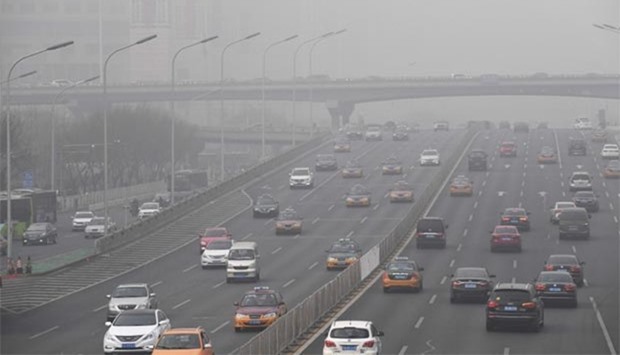A plane carrying the head of the world's biggest oil exporter was prevented from landing in the Chinese capital of Beijing on Tuesday because of thick smog blanketing large parts of northern China.
Amin Nasser, chief executive of the Saudi Arabian oil producer Aramco, was due to attend an event on Saudi culture at Beijing's National Museum, company officials said, but his plane was diverted after a fourth day of heavy smog led to the cancellation of as many as 181 flights.
China declared a "war on pollution" in 2014 amid concern its heavy industrial past was tarnishing its global reputation and holding back its future development.
But it has struggled to reverse the damage done by decades of breakneck economic growth, much of it based on the coal-burning power sector.
Despite months of efforts to hone its rapid response systems, air quality deteriorated in parts of the region on Tuesday, with the environment ministry warning that firms were flouting emergency restrictions.
Some power plants and chemical producers had not scaled back operations in line with regulations, and drivers in Beijing had also been ignoring traffic restrictions, according to China Environmental News, the official publication of the Ministry of Environmental Protection.
The paper said as many as 24 cities had issued pollution "red alerts" by Tuesday but, despite the implementation of emergency measures, smog concentrations had increased in some places.
They included several major cities in the industrial province of Hebei, which surrounds Beijing.
Red alerts are issued when an air quality index (AQI) is forecast to exceed 200 for more than four days in succession, 300 for more than two days or 500 for at least 24 hours.
In Handan, a major steel producer, the 24-hour average AQI at one monitoring station reached a record 780, according to environmental group Greenpeace.
Beijing Capital International Airport said on its microblog that 181 flights had been cancelled by 8 am, although 50 were able to operate. Flights had already been affected at other airports, including in the neighbouring city of Tianjin.
The airport blamed fog but PM 2.5 levels soared to more than 450 micrograms per cubic metre in parts of the city overnight, according to the Beijing government.
Outside operations have also been suspended at more than 3,000 construction sites in Beijing, its housing commission said.
China has repeatedly blamed "unfavourable weather" for much of the pollution this month, with high humidity and low wind speeds preventing the dispersal of emissions from coal-fired winter heating plants.

Smog hangs over a road on a polluted day in Beijing on Tuesday.
